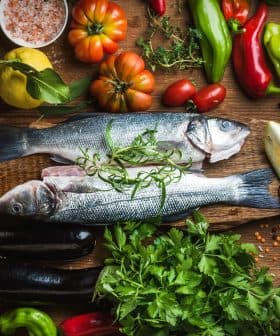The Mediterranean Diet Revisited
The Mediterranean diet, particularly the Greek version, is known for its health benefits, including protecting against heart disease, cancer, diabetes, and obesity. The diet is characterized by a high intake of vegetables, fruits, complex carbohydrates, and olive oil, with red meat consumed sparingly and the main source of protein coming from beans and fatty fish like sardines and anchovies. Additionally, the diet includes yogurt, herbs, spices, and condiments that contribute to its health properties.
The Miracle of the Mediterranean diet: It leads to long life, protects from heart disease, cancer, diabetes, and obesity.
But do we really know what actually makes the Mediterranean diet so special? One might initially think it’s the ongoing flow of extra-virgin olive oil, but it’s much more than that. The true Greek Mediterranean diet is beneficial for many more reasons.
When did it all start?
Recognized as one of the healthiest diets in the world, the Mediterranean diet is not a creation of some doctor or nutritionist, nor is it a passing fad, it’s a centuries-
old eating lifestyle originally followed by the people living in the Mediterranean basin.
It all started when University of Minnesota Physiologist Ancel Keys studied the diets and habits of seven countries in the 1950s (often referred to as the Seven Countries Sudy), including the US, Japan, and Greece. He found that individuals from Greece had the lowest rates of heart disease and lived the longest even though they had a relatively high intake of fat. This astounding information was enough to take the Mediterranean diet from the tiny villages of Greece to the headlines of cities around the world. In 1993, two Greeks, Antonia Trichopoulou, Professor of Preventative Medicine and Nutrition at the University of Athens Medical School, and Dimitrios Trichopoulos, Professor of Cancer Prevention and Professor of Epidemiology at the Department of Epidemiology of the Harvard School of Public Health, developed the Mediterranean diet Pyramid under the auspices of Harvard University.
It has ever since become a scientific standard paving the way for nutritionists, doctors and specialists to identify what’s good for us and what’s not. Thanks to an ever-growing body of evidence that the diet can prevent everything from heart disease to cancer, the Mediterranean diet is what sets the standard for long life and good health.
Where is it today?
When you speak about the Mediterranean diet today people across the globe know what it’s all about. It’s been 15 years since the two doctors Trichopoulos developed the Mediterranean pyramid, and today you can find restaurants serving up Mediterranean-inspired delicacies on almost every corner and Greek food products in almost every major grocery store. There is even a packaging symbol, Med Mark, designed to help shoppers quickly identify healthy Mediterranean diet products in supermarkets. And recently the Mediterranenan diet was awarded UNESCO World Heritage status.
But although the Mediterranean diet has gained international recognition and increased popularity in many places in the world, one can’t say the same of its birthplace. A recent United Nations Food and Agriculture Organization report shows that Greeks, Italians and other Mediterranean nations are consuming more calories, more saturated fat and anything but following their forefather’s diet.
Researchers attribute this change in eating habits not only to increased income but to diverse factors such as the rise in the number of supermarkets, working women having less time to cook, families eating out more often in fast-food restaurants, and of course, less exercise. Sadly today, a massive 75% of the population in Greece is obese or overweight — an ironic leader in the European Union.
What is the Greek-Mediterranean diet?
If you live outside of Greece you may think the Greek diet is made up of all those tasty dishes you find in Greek restaurants such as pastitsio, fried cheese (saganaki) and souvlaki. Actually, these foods have little to do with the traditional Greek diet that is known for its health properties. When we talk about the Mediterranean diet, we are referring to the traditional dietary habits of the inhabitants of countries in the Mediterranean region.
We all think of olive oil when we hear the term, but in fact, it is a lot of other things. It is characterized by a high intake of vegetables, fruits and complex carbohydrates with the main source of fat being olive oil. As a result, it is rich in fiber, phytochemicals and antioxidants. However, it is not a vegetarian diet, as red meat is something to be enjoyed once a month, with the main source of protein coming from beans and local fatty fish such as sardines and anchovies.
Reaping the benefits of the Mediterranean diet and the traditional Greek diet is all about using the right nutritional ingredients in the right way. In other words, just adding olive oil to all your dishes isn’t going to do the trick; you need to consume a variety of foods in order to see healthy results.
Olive Oil
Olive oil is the main feature of the Greek Mediterranean diet. Greeks consume more olive oil than any other nation in the world, a massive 26 liters per person annually. And though it has many health benefits, it also has one disadvantage: it’s a calorie booster, which means many people avoid it for fear of gaining weight. In fact, many people believe that the increasing rates of obesity in the Mediterranean region is due to the high-fat content of the diet. However, Trichopoulou notes that there has been a misunderstanding in the role of oil in the rise of obesity in the Mediterranean countries. Trichopoulou says that it is the result of inadequate physical activity and a surplus of calories. In other words too much food and not enough exercise. Certainly, olive oil has many calories, but a diet can be followed that can include oil while staying within normal limits. This can be accomplished by combining olive oil with vegetables, therefore achieving a medium caloric level dish.
It should be noted that the Mediterranean diet is not a low-fat diet, 40 percent of the calories come from fat, much higher compared to the 30 percent recommended in a conventional diet. Can this be too much fat? No, according to Trichopoulou, as long as the fat comes from olive oil. In fact, several studies have shown that a reduced fat diet was no more effective in keeping away weight gain, heart disease, diabetes, or other chronic diseases compared to a normal fat diet. In other words, don’t be afraid of olive oil, it actually protects you.
Vegetables
We know that vegetables play an important role in the Greek diet and is one of the reasons that this diet is so healthy. But how much do Greeks really eat and how do they do it? Greeks have had a history of high consumption of fruits and vegetables. Although Greeks do not follow exactly the Mediterranean diet as it was 40 years ago, there are still many characteristics of this diet present today. One of the reasons they are able to maintain this high consumption is the fact that vegetables are consumed in 2 ways, as a salad, but more importantly, and this is what differentiates them from
other cultures, as a main dish.
Most Greeks consume vegetables as a main dish 2 – 3 times a week. These dishes are somewhat like casseroles and are usually made from seasonal vegetables such as green beans, eggplant, artichoke, cauliflower and okra. Basically it is a combination of vegetables, herbs, tomatoes and olive oil. This dish is called lathera from the Greek word lathi which means oil. Normally a big plate is consumed, which easily covers at least 3 – 4 servings of vegetables. In addition, Greeks have a huge number of vegetarian recipes due to the scarcity of meat (in the past) but also because of religion. The Greek Orthodox Religion requires its followers to fast for over 180 days a year, this consisted of avoiding animal products which meant that they had to find a way to have tasty delicious vegetarian dishes. Today most Greeks fast an average of 10 days a year, but even so they still consume these “vegetarian” dishes on regular basis.
Beans
Beans are a perfect diet food. They’re rich in protein, low in fat, high in fiber and satisfying and cheap. Easy to make, boiled or from a can, they can be consumed with a touch of olive oil, lemon, tomatoes and herbs. Studies have shown that consuming beans can protect from heart disease and cancer and they promote weight loss as they as they are great source of fiber promoting satiety. Greeks consume them prepared with tomato, onion, and olive oil, and also accompanied with cheese and bread.
Fish
We already know that fish is good for you. But some fish are more beneficial than others. Traditionally, Greeks consumed fatty fish, which are rich in Omega‑3 fatty acids, mostly sardines and anchovies as these were the local choices. The fat from these fish shield us from heart disease, arthritis, diabetes and even depression. It is recommended that we consume 3 ounces of fatty fish 2 – 3 times a week to fulfill our essential fatty acid needs. Smaller fish have lower levels of mercury, compared to larger fish such as salmon, tuna and swordfish.
Yogurt
The traditional Greek diet did not include large amounts of milk, as many people in the Mediterranean region were lactose intolerant. Instead, they met their dairy needs through yogurt and cheese. Besides being a good source of calcium and protein, yogurt contains “good” bacteria that are beneficial for the gastrointestinal system. The bacteria actually strengthen your immune system, aids digestion and help the absorption of certain nutrients.
Herbs, Spices and Condiments
The spice of life, herbs and spices play a very important role in Greek cuisine. Olive oil alone won’t do the trick. The most commonly used are garlic, lemon, onion, oregano, parsley, laurel, mint, dill, cinnamon, cumin, and allspice. Herbs contain biochemical substances that actually work towards protecting us from chronic disease.










